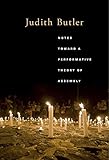Notes Toward a Performative Theory of Assembly / Judith Butler.
Material type: TextSeries: Mary Flexner Lecture Series of Bryn Mawr College ; 1Publisher: Cambridge, MA : Harvard University Press, [2015]Copyright date: ©2015Edition: Pilot project. eBook available to selected US libraries onlyDescription: 1 online resource (230 p.)Content type:
TextSeries: Mary Flexner Lecture Series of Bryn Mawr College ; 1Publisher: Cambridge, MA : Harvard University Press, [2015]Copyright date: ©2015Edition: Pilot project. eBook available to selected US libraries onlyDescription: 1 online resource (230 p.)Content type: - 9780674495548
- 323.4/701 23
- K3256 .B88 2015eb
- online - DeGruyter
| Item type | Current library | Call number | URL | Status | Notes | Barcode | |
|---|---|---|---|---|---|---|---|
 eBook
eBook
|
Biblioteca "Angelicum" Pont. Univ. S.Tommaso d'Aquino Nuvola online | online - DeGruyter (Browse shelf(Opens below)) | Online access | Not for loan (Accesso limitato) | Accesso per gli utenti autorizzati / Access for authorized users | (dgr)9780674495548 |
Frontmatter -- Contents -- Introduction -- 1. Gender Politics and the Right to Appear -- 2. Bodies in Alliance and the Politics of the Street -- 3. Precarious Life and the Ethics of Cohabitation -- 4. Bodily Vulnerability, Coalitional Politics -- 5. “We the People”– Thoughts on Freedom of Assembly -- 6. Can One Lead a Good Life in a Bad Life? -- Notes -- Acknowledgments -- Credits -- Index
restricted access online access with authorization star
http://purl.org/coar/access_right/c_16ec
A Times Higher Education Book of the Week Judith Butler elucidates the dynamics of public assembly under prevailing economic and political conditions, analyzing what they signify and how. Understanding assemblies as plural forms of performative action, Butler extends her theory of performativity to argue that precarity—the destruction of the conditions of livability—has been a galvanizing force and theme in today’s highly visible protests. “Butler’s book is everything that a book about our planet in the 21st century should be. It does not turn its back on the circumstances of the material world or give any succour to those who wish to view the present (and the future) through the lens of fantasies about the transformative possibilities offered by conventional politics Butler demonstrates a clear engagement with an aspect of the world that is becoming in many political contexts almost illicit to discuss: the idea that capitalism, certainly in its neoliberal form, is failing to provide a liveable life for the majority of human beings.” —Mary Evans, Times Higher Education “A heady immersion into the thought of one of today’s most profound philosophers of action…This is a call for a truly transformative politics, and its relevance to the fraught struggles taking place in today’s streets and public spaces around the world cannot be denied.” —Hans Rollman, PopMatters
Mode of access: Internet via World Wide Web.
In English.
Description based on online resource; title from PDF title page (publisher's Web site, viewed 01. Dez 2022)


